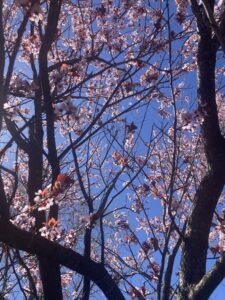The tree stands about 20 yards away, in a little clearng next to the gazebo. I’ve spent the last 20 minutes sitting quietly on the grassy lawn of the park and I’ve only just noticed it, blocking out all senses but the chirping of the birds. So when I finally crack open my eyes, I have to blink a bit to adjust to the afternoon sun. It’s a perfect cloudless day, but a chilly wind penetrates my double-layers, and I shiver. I look down at the notes I’ve jotted down so far:
- owl hooting (barn owl?)
- birds
- very green grass
The world is coming alive, as it always does after the harsh winter. I look around at the park, fixing my eyes on the tree once more. The tree’s vibrant pink flowers stand out against all the greens and blues. I stand up, stretch my legs, and begin to stroll towards the gazebo. When I reach the tree, I position myself directly beneath it and point my camera up. The branches unfurl out, allowing peaks of blue between the pink, until they disappear beyond the edges of the square frame. I take the shot, tuck my phone in a pocket, and sit down on the ground one more.
I’m happy to see about a half-dozen bees, buzzing around the flowers, pollinating. I’ve always liked bees. As a child, when all my friends would scatter in the presence of one, I would go completely still, letting the bee rest on my skin, trying to keep my breathing shallow, and my body relaxed. Every time, a few moments would pass, and the bee would float away again. I like to think they appreceiated my non-reactive approach, driven by fear though it was. I let the bees be and they let me be in return.
The tree itself is small, probably planted relatively recent. I feel slightly ashamed that I don’t know what it’s called, being the daughter of a forester with whom I went on countless walks in the woods growing up. As I gaze up, I observe the thinness of its branches, the smallness of its flowers. It seems rather fragile, bending easily in the slight breeze. Perhaps it’s the relative newness of spring that makes it seem so vulnerable, still fresh with the memory of a relentless cold. But the passing of the seasons guarantees many warm days ahead, those summer days when the winter is a distant memory. I imagine the tree growing sturdier as the days go by, until it stands strong and proud against the whipping wind of an August afternoon thunderstorm. It gives me hope, that I, too, can stand straight in the face of the seasons ahead.
I stay here a few minutes more, eyes and ears alert, waiting patiently for something else to observe. But it’s still early and the earth is waking up slowly, so I sit up, gather my things, and begin to walk away, making sure to brush the bark one last time.

